 16 citations,
March 2020 in “Facial Plastic Surgery Clinics of North America”
16 citations,
March 2020 in “Facial Plastic Surgery Clinics of North America” Platelet-Rich Plasma (PRP), a substance from a patient's own blood, can stimulate hair regrowth in people with Androgenetic Alopecia (AGA) who haven't had success with other treatments, but more research is needed to optimize its use.
 15 citations,
October 2020 in “Journal of Investigative Dermatology Symposium Proceedings”
15 citations,
October 2020 in “Journal of Investigative Dermatology Symposium Proceedings” Platelet-Rich Plasma (PRP) could potentially help regrow hair in people with Alopecia Areata, but more research is needed to confirm its effectiveness.
 15 citations,
August 2019 in “Dermatologic Therapy”
15 citations,
August 2019 in “Dermatologic Therapy” Platelet-rich plasma (PRP) may help treat hair loss in patients with frontal fibrosing alopecia who don't respond to other treatments.
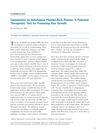 13 citations,
July 2012 in “Dermatologic Surgery”
13 citations,
July 2012 in “Dermatologic Surgery” Platelet-rich plasma (PRP) may help promote hair growth and improve graft survival after hair transplantation, but more research is needed to confirm its effectiveness and determine the best dosage.
 12 citations,
June 2020 in “Dermatology and therapy”
12 citations,
June 2020 in “Dermatology and therapy” Platelet-Rich Plasma (PRP) can promote new hair growth and increase hair density, but its effectiveness varies depending on the type of hair loss.
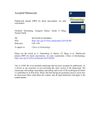 12 citations,
June 2019 in “Clinics in dermatology”
12 citations,
June 2019 in “Clinics in dermatology” PRP shows promise for skin rejuvenation but needs more research.
 12 citations,
April 2015 in “InTech eBooks”
12 citations,
April 2015 in “InTech eBooks” Platelet Rich Plasma (PRP) shows promise for tissue repair and immune response, but more research is needed to fully understand it and optimize its use.
8 citations,
June 2013 in “Journal of bone and joint surgery. American volume/The Journal of bone and joint surgery. American volume” Platelet-rich plasma (PRP) shows no significant benefit for bone and soft-tissue injuries or wound healing, and its effectiveness may improve with customization.
6 citations,
June 2020 in “Journal of Drugs in Dermatology” PRP can help regrow hair in people with alopecia.
 6 citations,
October 2018 in “Dermatologic Surgery”
6 citations,
October 2018 in “Dermatologic Surgery” PRP therapy helps slow hair loss and increases hair thickness.
 6 citations,
August 2014 in “Dermatologic Surgery”
6 citations,
August 2014 in “Dermatologic Surgery” PRP injections may improve hair loss condition, but more research needed.
 5 citations,
October 2021 in “Dermatologic Surgery”
5 citations,
October 2021 in “Dermatologic Surgery” Platelet-rich plasma (PRP) can significantly improve melasma, a skin pigmentation disorder, but may not add benefits when used with certain other treatments.
 4 citations,
January 2022 in “Transfusion Medicine and Hemotherapy”
4 citations,
January 2022 in “Transfusion Medicine and Hemotherapy” Platelet-Rich Plasma (PRP) has potential benefits in plastic surgery, especially for skin grafts, wound healing, hair loss, mild Carpal Tunnel Syndrome, and TMJ disorders, but more research is needed to confirm its effectiveness.
 4 citations,
August 2018 in “Facial Plastic Surgery Clinics of North America”
4 citations,
August 2018 in “Facial Plastic Surgery Clinics of North America” Platelet-Rich Plasma (PRP), a protein-rich extract from a patient's blood, shows promise in improving hair density, thickness, and quality, but the best method of use and number of treatments needed for noticeable results are still unclear.
 3 citations,
August 2020 in “PubMed”
3 citations,
August 2020 in “PubMed” Platelet-rich plasma (PRP) is effective in treating various skin conditions and improving hair density, thickness, and patient satisfaction, with lower relapse rates for Alopecia Areata.
 3 citations,
September 2018 in “Dermatologic Surgery”
3 citations,
September 2018 in “Dermatologic Surgery” Platelet-Rich Plasma (PRP) can improve hair loss in cicatricial alopecia cases, but treatment must be ongoing and results vary among patients.
 3 citations,
January 2016 in “PubMed”
3 citations,
January 2016 in “PubMed” Platelet-Rich Plasma (PRP) is a cheap and promising treatment for hair loss, improving hair count, thickness, and strength without major side effects.
3 citations,
May 2015 in “Journal of archives in military medicine” Platelet-rich plasma (PRP) shows promise in military medicine but its effectiveness varies.
 2 citations,
November 2023 in “Curēus”
2 citations,
November 2023 in “Curēus” Platelet-rich plasma (PRP) speeds up skin wound healing and has potential in medical and cosmetic uses.
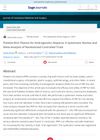 2 citations,
August 2023 in “Journal of Cutaneous Medicine and Surgery”
2 citations,
August 2023 in “Journal of Cutaneous Medicine and Surgery” PRP is effective and safe for increasing hair density in people with hair loss.
 2 citations,
June 2021 in “Cosmoderma”
2 citations,
June 2021 in “Cosmoderma” Platelet-rich plasma (PRP) shows promise in skin and hair treatments but results vary with preparation methods.
 2 citations,
April 2014 in “PubMed”
2 citations,
April 2014 in “PubMed” Platelet Rich Plasma (PRP) shows promise for hair growth, ulcer healing, and skin rejuvenation, but more research is needed for consistent results and it's not suitable for people with certain blood conditions.
 1 citations,
November 2020 in “Journal of The American Academy of Dermatology”
1 citations,
November 2020 in “Journal of The American Academy of Dermatology” PRP helps treat hair loss effectively with natural methods.
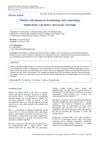 1 citations,
February 2020 in “International journal of research in dermatology”
1 citations,
February 2020 in “International journal of research in dermatology” PRP therapy is effective for hair loss, skin rejuvenation, wound healing, and scar treatment.
 1 citations,
May 2018 in “Journal of Evolution of medical and Dental Sciences”
1 citations,
May 2018 in “Journal of Evolution of medical and Dental Sciences” Platelet Rich Plasma (PRP) injections can effectively reduce hair loss and improve hair growth in both men and women suffering from androgenic alopecia.
 1 citations,
December 2017 in “Journal of clinical and investigative dermatology”
1 citations,
December 2017 in “Journal of clinical and investigative dermatology” Platelet-Rich Plasma (PRP) treatment can significantly increase hair count and thickness in people with Androgenetic Alopecia (AGA) with minimal side effects.
 1 citations,
June 2017 in “Journal of The American Academy of Dermatology”
1 citations,
June 2017 in “Journal of The American Academy of Dermatology” PRP treatment for hair loss shows promise, with 58% of patients satisfied and most noticing improvement within 6 months.

PRP therapy effectively treats hair loss, wrinkles, scars, ulcers, and skin pigmentation disorders.
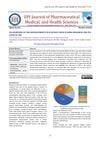 August 2024 in “UPI Journal of Pharmaceutical Medical and Health Sciences”
August 2024 in “UPI Journal of Pharmaceutical Medical and Health Sciences” PRP shows promise in musculoskeletal rehabilitation but needs standardized reporting for better outcomes.

PRP is promising for skin, hair, and wound treatments but needs standardized methods and more research.


























